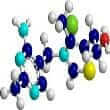Background
- Thiamine (also spelled "thiamin") is a water-soluble B-complex vitamin, previously known as vitamin B1 or aneurine. Thiamine was isolated and characterized in the 1920s and thus was one of the first organic compounds to be recognized as a vitamin.
- Thiamine is involved in numerous body functions, including nervous system and muscle functioning; the flow of electrolytes in and out of nerve and muscle cells (through ion channels); multiple enzyme processes (via the coenzyme thiamine pyrophosphate); carbohydrate metabolism; and the production of hydrochloric acid (which is necessary for proper digestion). Because there is very little thiamine stored in the body, depletion can occur quickly, within 14 days.
- Severe chronic thiamine deficiency (beriberi) can result in potentially serious complications involving the nervous system, brain, muscles, heart, and gastrointestinal system.
- Dietary sources of thiamine include beef, brewer's yeast, legumes (beans, lentils), milk, nuts, oats, oranges, pork, rice, seeds, wheat, whole-grain cereals, and yeast. In industrialized countries, foods made with white rice or white flour are often fortified with thiamine, because most of the naturally occurring thiamine is lost during the refinement process.
- Thiamine is used as part of a treatment for metabolic disorders (including subacute necrotizing encephalopathy, maple syrup urine disease, pyruvate carboxylase deficiency, and hyperalaninemia) and thiamine deficiency symptoms (including beriberi, Wernicke's encephalopathy, Korsakoff's psychosis, and Wernicke-Korsakoff syndrome), and in alcoholic individuals. It has been studied as part of a treatment for other uses, but conclusions cannot be drawn at this time.
References
- Anon. From the Centers for Disease Control and Prevention. Lactic acidosis traced to thiamine deficiency related to nationwide shortage of multivitamins for total parenteral nutrition--United States, 1997. JAMA 1997;278(2):109, 111.
View Abstract - Abbas ZG, Swai AB. Evaluation of the efficacy of thiamine and pyridoxine in the treatment of symptomatic diabetic peripheral neuropathy. East Afr Med J 1997;74(12):803-808.
View Abstract - Avenell A, Handoll HH. Nutritional supplementation for hip fracture aftercare in older people. Cochrane Database Syst Rev. 2010 Jan 20;(1):CD001880.
View Abstract - Benton D, Fordy J, Haller J. The impact of long-term vitamin supplementation on cognitive functioning. Psychopharmacology (Berl) 1995;117(3):298-305.
View Abstract - Cook CC, Hallwood PM, Thomson AD. B Vitamin deficiency and neuropsychiatric syndromes in alcohol misuse. Alcohol Alcohol 1998;33(4):317-336.
View Abstract - Day E, Bentham P, Callaghan R, Kuruvilla T, George S. Thiamine for Wernicke-Korsakoff Syndrome in people at risk from alcohol abuse. Cochrane Database Syst Rev. 2004;(1):CD004033.
View Abstract - Hamadani M, Awan F. Role of thiamine in managing ifosfamide-induced encephalopathy. J Oncol Pharm Pract. 2006 Dec;12(4):237-9.
View Abstract - Kabat GC, Miller AB, Jain M, et al. Dietary intake of selected B vitamins in relation to risk of major cancers in women. Br J Cancer 2008 Sep 2;99(5):816-21.
View Abstract - Nakasaki H, Ohta M, Soeda J, et al. Clinical and biochemical aspects of thiamine treatment for metabolic acidosis during total parenteral nutrition. Nutrition 1997;13(2):110-117.
View Abstract - Olsen BS, Hahnemann JM, Schwartz M, et al. Thiamine-responsive megaloblastic anaemia: a cause of syndromic diabetes in childhood. Pediatr Diabetes 2007 Aug;8(4):239-41.
View Abstract - Proctor ML, Murphy PA. Herbal and dietary therapies for primary and secondary dysmenorrhoea. Cochrane Database Syst Rev. 2001;(3):CD002124.
View Abstract - Ranganathan LN, Ramaratnam S. Vitamins for epilepsy. Cochrane Database Syst Rev 2005;(2):CD004304.
View Abstract - Saif MW. Is there a role for thiamine in the management of congestive heart failure? South Med J 2003;96(1):114-115.
View Abstract - Sohrabvand F, Shariat M, Haghollahi F. Vitamin B supplementation for leg cramps during pregnancy. Int J Gynaecol Obstet 2006 Oct;95(1):48-9.
View Abstract - Yates AA, Schlicker SA, Suitor CW. Dietary Reference Intakes: the new basis for recommendations for calcium and related nutrients, B vitamins, and choline. J Am Diet Assoc 1998;98(6):699-706.
View Abstract







